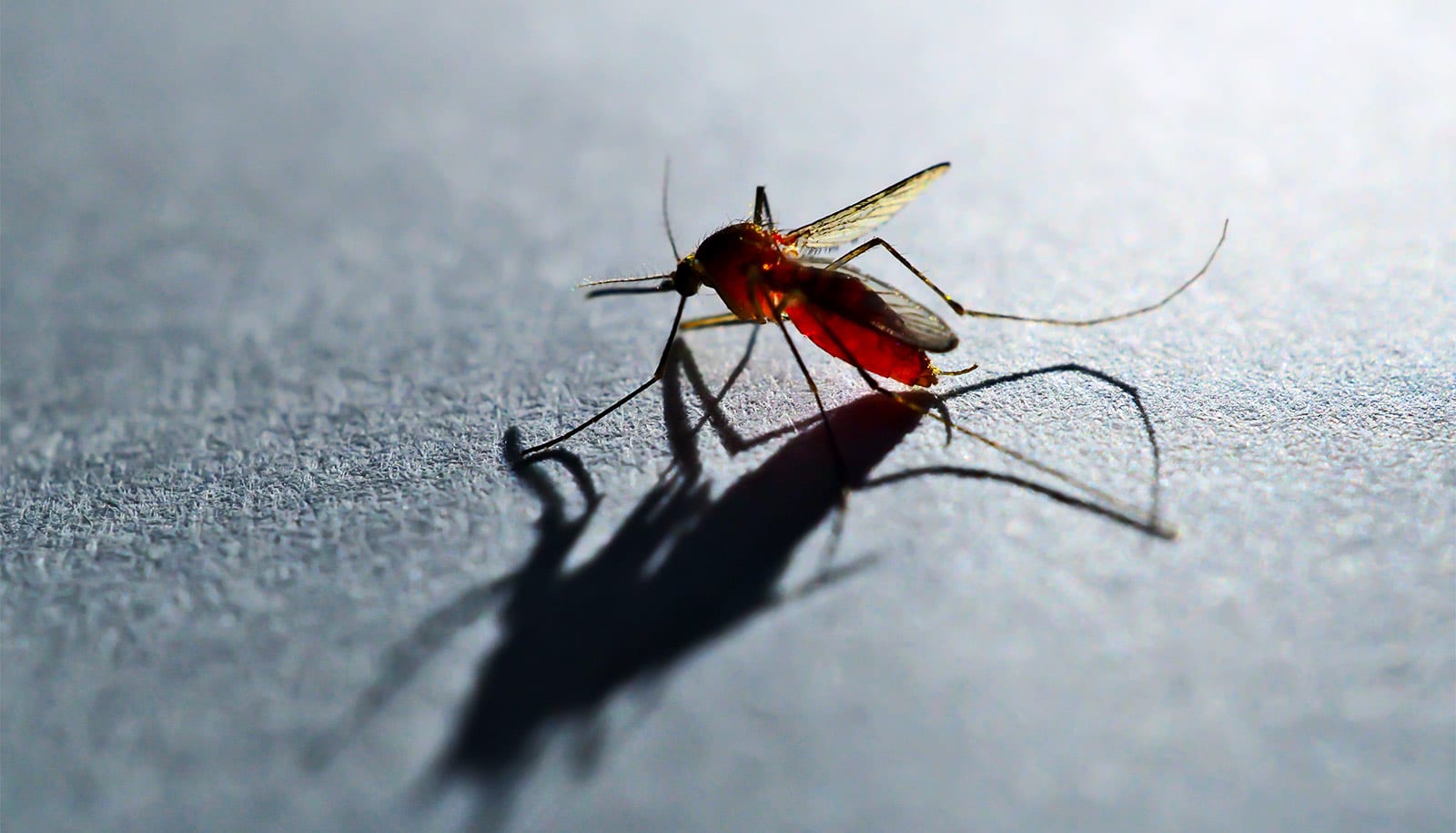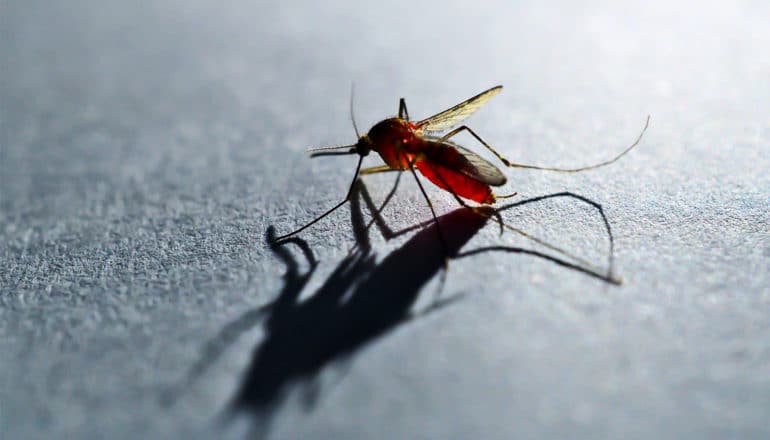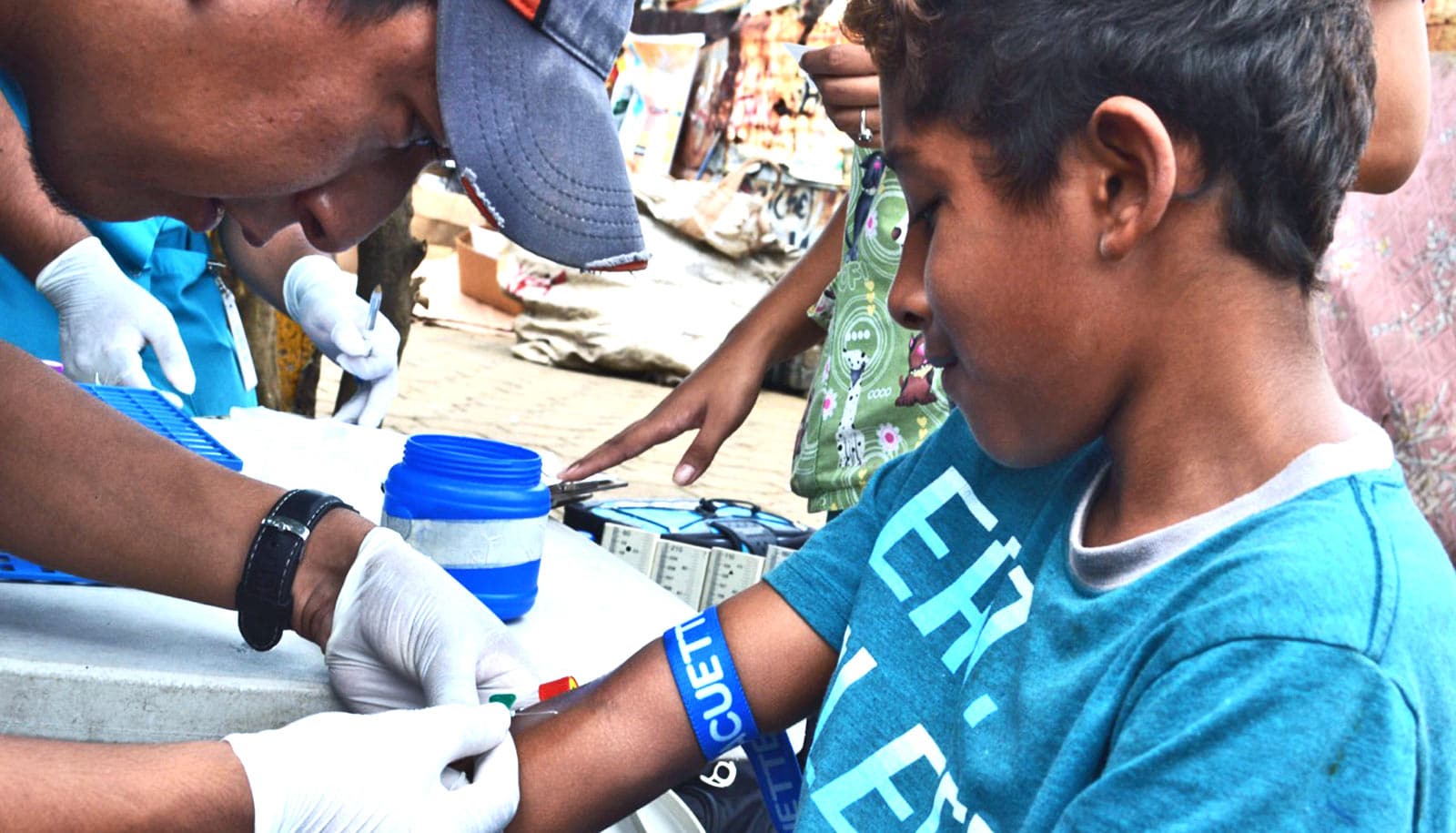
(Credit: Getty Images )
Stuffed mosquitoes are less likely to take a bite
A new discovery could make mosquitoes feel more full—and safer to be around.

A new discovery clarifies the host-seeking and blood-feeding biology that makes female mosquitoes such a menace—and offers a way to persuade them to not bite at all.
For a new study, Leslie B. Vosshall, a professor at Rockefeller University and colleagues conducted experiments on Aedes aegypti mosquitoes, the species responsible for spreading dengue, Zika, chikungunya, and yellow fever.
Human beings, whose blood contains the protein they need to produce their eggs, attract female Aedes. Yet once they have fed, that attraction declines precipitously, and the bloated mosquitoes show little interest in seeking another blood meal for several days.
“It’s like the ultimate Thanksgiving dinner,” says Laura Duvall, a postdoctoral fellow who led the study, which appears in Cell.
Dinner time!
To reproduce that long-term postprandial effect, scientists can inject female mosquitoes with large doses of small protein-like molecules called neuropeptides, which activate specialized receptors.
But the list of possible neuropeptide-receptor combinations is long, and researchers need better tools to develop compounds that can efficiently suppress a female’s feeding behaviors without having other, unwanted effects.
Fortunately, similar receptors regulate feeding behavior in many species, including humans. That shared evolutionary inheritance provided the clue researchers needed to solve the mystery of the mosquito’s missing appetite.
In humans, so-called Neuropeptide Y or NPY receptors regulate food intake, and the pharmaceutical industry has developed anti-obesity drugs that both activate and inhibit them.
The researchers reckoned the same drugs might affect the mosquitoes’ NPY-like receptors, too. And they were right.
When the researchers fed female mosquitoes saline solution doped with drugs that activate human NPY receptors, the insects’ attraction to a human host—measured by their willingness to fly towards a bit of nylon stocking that Duvall wore long enough to absorb the bodily odors that scream “mealtime” to mosquitoes—plummeted just as if they had had a blood meal.
Alternately, when the researchers fed the mosquitoes blood doped with a drug that inhibits the same receptors, they behaved as if they had not eaten at all.
Human safety
To pinpoint the particular receptor the human drugs were acting on, the team used their knowledge of the mosquito genome to clone all 49 of the species’ possible neuropeptide receptors and exposed them to the same compounds. Only one, an NPY-like receptor known as NPYLR7, responded to all the human drugs that had affected the mosquitoes.
“We were impressed and amazed that drugs designed to affect human appetite worked perfectly to suppress mosquito appetite,” Vosshall says.
What’s more, when the team fed blood to mutant Ae. Aegypti they had genetically engineered to lack proper NPYLR7 receptors, those mosquitoes were as interested as ever in their next meal—confirming that NPYLR7 was indeed the receptor they were looking for.
At that point, the researchers knew that NPYLR7 might be what they have long sought: a means of preventing mosquitoes from biting people. But the human drugs they used to manipulate the receptor in the lab wouldn’t be suitable for use in the wild, where they might affect people as well as mosquitoes.
Instead, they began searching for molecules that would selectively activate NPYLR7 without triggering human NPY receptors. Starting with an initial list of more than 250,000 candidates, the team ultimately settled on “compound 18″—a molecule that suppressed Aedes‘ host-seeking behavior with no off-target effects.
Bite-free future?
Demonstrating that a drug will cause female mosquitoes to turn up their noses at a piece of tasty-smelling nylon is one thing, however. Proving that it will prevent them from biting a living, breathing host is another.
So for their final test, the researchers let the mosquitoes loose on a live mouse. (While Aedes prefer humans, they will make do with other mammals when necessary.) Much to their satisfaction, mosquitoes that researchers fed compound 18 were as disinterested in feeding on the rodent as mosquitoes that had enjoyed a full-blown blood meal.
The team’s findings have far-reaching implications, both for future research and for vector control.
Now that the researchers know which receptor is responsible for switching off Ae. Aegypti‘s host-seeking and biting behaviors, they can begin to identify where it is produced in the insect’s body. (Although they still do not know exactly which naturally occurring neuropeptides activate NPYLR7, Duvall and colleagues now have a list of nine possible candidates.) That, in turn, will help them trace the larger neural circuits that govern the mosquito’s feeding behavior.
Malaria and Lyme disease
At the same time, their results suggest a new strategy for reducing the transmission of mosquito-borne diseases—and perhaps ailments spread by other insects, as well.
With a bit of luck, medicinal chemists could refine compound 18 to produce an even more potent molecule they could deliver to female mosquitoes in the wild through baited traps, or through the semen of genetically modified male mosquitoes that produce it themselves.
Muzzling Ae. Aegypti would be a boon in and of itself. But other blood-feeding, disease-carrying arthropods, including the mosquitoes that spread malaria and the ticks that transmit Lyme disease, also possess NPY-like receptors. It seems likely that a compound that suppresses Ae. Aegypti’s feeding behaviors would suppress theirs, too.
Source: Rockefeller University
The post Stuffed mosquitoes are less likely to take a bite appeared first on Futurity.
Share this article:
This article uses material from the Futurity article, and is licenced under a CC BY-SA 4.0 International License. Images, videos and audio are available under their respective licenses.


